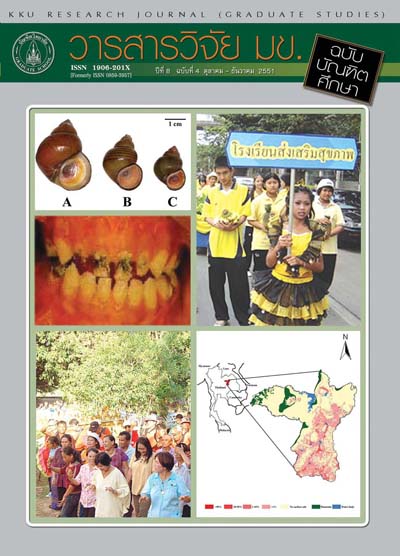An Attitude Survey of the M5 Students, Their Parents, English Language Teachers and Administrators toward Native and Non- Native English Speaking Teachers in Khon Kaen Province
Keywords:
Native and Non- Native Teachers in Khon Kaen Province(ผู้สอนภาษาอังกฤษที่เป็นเจ้าของภาษาและไม่ใช่เจ้าของภาษาในจังหวัดขอนแก่น)Abstract
The purpose of this survey was to identify the areas of concern from the learners and other stakeholderûs on native and non-native English speaking teachers in Khon Kaen Province and to document the whole exercise. In this regard we choose two sets of schools in Khon Kaen Province in the north eastern part of Thailand. One set of schools consists of large, medium and small schools which are situated in the urban area and the others are situated about 50 kilometers away in a rural area. The population was M5 students, their parents, English language teachers and administrators of the same schools. Teachers, students and their parents were asked to provide their opinion on five points rating scale through survey questionnaires, and SPSS V 11 program was used to synthesize the data. The survey questions for the teachers and parents included 20 parallel questions on NNEST / NEST, whereas, survey questionnaires for students had 44 parallel statements asking students on their opinions on NNEST / NEST. The administrators were interviewed individually for their inputs on academic and general attributes of both NESTs / NNEST as well as personal choice of the administrators. The results of the study shows that most of the teachers did not state whether they were satisfied with the performance of non-native English speaking teachers but the majority did state their dissatisfaction with native English speaking teachers. However, the majority of the students were satisfied with both NNESTs and NESTs. Similarly, the majority of the parents of the students were satisfied with both NNESTs and NESTs but, 44% were of the opinion that given a choice they prefer a NEST instead of a NNEST for their child. Finally, school administrators were satisfied with both the NNESTs and NESTs, but the majority stated that NNESTs were more qualified than the NESTs.
การสำรวจครั้งนี้มีวัตถุประสงค์เพื่อศึกษาเปรียบเทียบผลการแสดงความคิดเห็นของผู้เรียนและผู้ที่มีส่วนเกี่ยวข้องที่มีต่อครูผู้สอนภาษาอังกฤษทั้งที่เป็นเจ้าของภาษาและไม่ใช่เจ้าของภาษาในจังหวัดขอนแก่น กลุ่มตัวอย่างที่ใช้ในการวิจัยครั้งนี้คือ กลุ่มโรงเรียนสองกลุ่มในจังหวัดขอนแก่น กลุ่มแรกคือโรงเรียนที่มีขนาดใหญ่ ขนาดกลาง และขนาดเล็ก ซึ่งตั้งกระจายอยู่ในตัวเมืองจังหวัดขอนแก่น กลุ่มที่สองคือ กลุ่มโรงเรียนที่อยู่ห่างจากตัวเมืองไปประมาณ 50 กิโลเมตร กลุ่มประชากรที่ศึกษาคือ นักเรียนชั้นมัธยมศึกษาชั้นปีที่ 5 ในโรงเรียนดังกล่าว ผู้ปกครอง ครูผู้สอนภาษาอังกฤษ และผู้บริหารของโรงเรียน ในการศึกษาครั้งนี้ครูผู้สอน นักเรียน และผู้ปกครองได้แสดงความคิดเห็นโดยการตอบแบบสอบถามที่มีมาตราส่วนการประเมินค่า 5 ระดับ และใช้โปรแกรม SPSS เวอร์ชั่น 11 ในการวิเคราะห์ข้อมูล แบบสอบถามสำหรับครูผู้สอนและผู้ปกครองประกอบไปด้วยชุดคำถามเกี่ยวกับผู้สอนภาษาอังกฤษที่เป็นเจ้าของภาษาและไม่ใช่เจ้าของภาษาจำนวน 20 คำถาม ในขณะที่แบบสอบถามสำหรับนักเรียนมี 44 คำถาม นอกจากนี้ยังมีการใช้แบบสัมภาษณ์ผู้บริหารเป็นรายบุคคล เพื่อให้ทราบข้อมูลทางวิชาการและเหตุผลในการคัดเลือกครูผู้สอนที่เป็นเจ้าของภาษาและไม่ใช่เจ้าของภาษา จากการศึกษาพบว่า ครูผู้สอนส่วนใหญ่ไม่ได้แสดงความพึงพอใจต่อผู้สอนที่ไม่ใช่เจ้าของภาษา หากแต่รู้สึกไม่พึงพอใจกับผู้สอนชาวต่างชาติที่เป็นเจ้าของภาษา ในขณะที่กลุ่มนักเรียนและผู้ปกครองให้คำตอบในลักษณะเดียวกันว่า รู้สึกพึงพอใจกับผู้สอนทั้งที่ไม่ใช่เจ้าของภาษาและอาจารย์ผู้สอนชาวต่างชาติที่เป็นเจ้าของภาษา และร้อยละ 44 ของผู้ปกครองแสดงความคิดเห็นว่า หากมีทางเลือกก็ต้องการครูผู้สอนชาวต่างชาติที่เป็นเจ้าของภาษามากกว่าผู้สอนที่ไม่ใช่เจ้าของภาษา ส่วนกลุ่มของผู้บริหารแสดงความรู้สึกพึงพอใจกับทั้งผู้สอนที่ไม่ใช่เจ้าของภาษาและผู้สอนชาวต่างชาติที่เป็นเจ้าของภาษา โดยผู้บริหารส่วนใหญ่ได้แสดงความคิดเห็นว่าครูที่ไม่ใช่เจ้าของภาษามีคุณสมบัติเหมาะสมกว่าผู้สอนชาวต่างชาติที่เป็นเจ้าของภาษา



